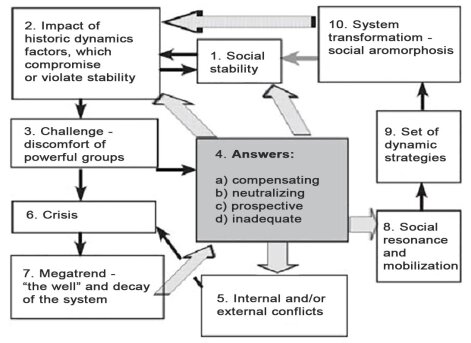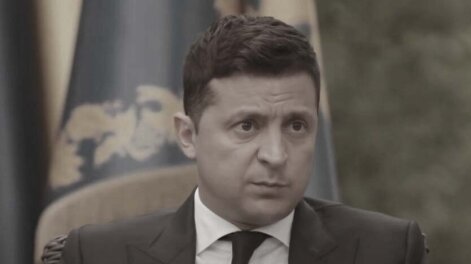It can be argued with good reason that the demand for at least autocracy in our country exists and is quite pronounced.
SERGIUS AK
In the light of the latest personnel shuffles of the president there is an active seething in media about the possible transformation of Zelensky into a future dictator. I propose to look at this from the sociological point of view.
A bit of theory
One of the methods of cognition in social science, to which sociology belongs, is the transition to higher levels of abstraction
(in philosophical language this is called ontologization). The application of this approach to historical events leads to a simple scheme: a certain social system (e.g., family, district, city, estate, class, civilization) can be either in a relatively stable state, or it is undergoing significant transformations. These changes need to be considered from the point of view of maintaining the integrity of the system and its viability.
The temporal dynamics of such a system consists in the cyclical change of various phases: stability, challenge, response, decline, prosperity. The phase of social stability is characterized by the constancy of routine processes, in which habitual views on “life” prevail. In the challenge phase, stability is influenced by various external and internal factors, which leads to a significant change in the behavior, ideas and views of influential social groups. In the response phase, an attempt is made to resolve difficulties, solutions are developed and more or less coordinated actions are taken to overcome the problems facing society. If, as a result of these decisions and actions, there is a significant decrease in the negative influence of the factors of the call phase (an adequate response was chosen), then the system returns to a state of equilibrium. If, on the contrary, there is an increase in the destructive impact of negative factors (an inadequate response was chosen), then a series of conflicts and crises ensues, and even disintegration is possible. In the end, the system stabilizes, but at a lower level, i.e. it enters a phase of decline. Sometimes, with especially “successful” decisions and actions (a promising answer was chosen), the system makes a qualitative leap in its development, a breakthrough, and moves to stabilization at a new, much better level of evolutionary development, that is, in the flourishing phase.

universal model of historical dynamics by N. Rozov
Moreover, each phase from this model has its own mechanisms and resources involved, which I will not list to save space and time.
Realities of Ukraine
If we take our state and the society inhabiting it as the above-described system, and try to determine which phase we are in now, then I think I will not be mistaken if I say that this is phase 7 of the crisis, provoked by internal and external conflicts of phase 5 as a result inadequate responses of phase 4. As can be seen from the diagram, a very likely scenario for overcoming the crisis is the disintegration of the system, in our case it means the disintegration of Ukraine as a sovereign state. To avoid this, we need to return to the phase of searching for answers and find at least such an adequate answer that will return us to a certain level of stability. Ideally, of course, we would need to find a promising solution that can cause social mobilization in society and send us to a breakthrough, to systemic institutional changes. But not with our happiness, we lost our social outbursts during the Maidans in 2004 and 2014.
Let us dwell on the consideration of the options for adequate answers. Their possible presence is determined by several factors:
- the vastness of the available “repertoire” for the choice of solutions, which is primarily ensured by the collegiality of their preparation, the level of development of various centers of excellence and services, communication efficiency between them and decision-making centers;
- flexibility in use, modification, combination of various approaches and solutions;
- variety and completeness, i.e. the presence of such ideas, attitudes, interests, resources that provide group solidarity and efficiency.
I suggest that the readers themselves judge the compliance of these conditions with what is happening in Ukraine.
As historical experience shows, the most frequent options for responding to challenges are either repeating a strategy that worked earlier in similar conditions, or reinforcing the current customary practice in the hope that it will somehow “dissipate” itself. Our president, when taking office, due to his general incompetence, clearly followed the latter option, letting many things in the country go by themselves or leaving them at the mercy of his entourage. As a result: “We have what we have”.
Now, to correct the situation, he seems to have decided to resort to the first answer, i.e. apply successful historical experience. Guess exactly whose experience he is going to apply? Which of the past or modern figures will serve as a model for him? If you suddenly thought about Lee Kuan or at least Pinochet, then you clearly assume that our president has a much larger brain than he has in reality. Our Ze will not go so far for inspiring examples, he has them much closer, across the border, either northern or eastern.
And again, a little theory
The cyclical nature of the repeated phases of the development of a social system described at the beginning is caused by similar processes of interdependence of various mental and social components. Cultural and mental components belong to the mental sphere and consist of various kinds of habitus. This concept was introduced into everyday life by P. Bourdieu and is interpreted as “a system of acquired schemes that act in practice as categories of perception and evaluation or as a principle of distribution by classes, at the same time as an organizational principle of action”, that is, it is a system of stereotypes, attitudes, frames, which we are guided by, often without realizing it ourselves, in our judgments and actions.
Cultural habits, as the most profound and archetypal ones, are passed down from generation to generation through language, literature, films, traditions, etc. It is with such habits that the cyclic reciprocating motion of the considered phases is associated. Changing such deep attitudes requires a significant time period with a change in generations (evolutionary dynamics) or strong social upheavals (revolutionary dynamics). Mental habit associated with cognitive, i.e. cognitive, human activities can change much easier and faster. It is they who, in the main, govern the daily behavior of people.

























